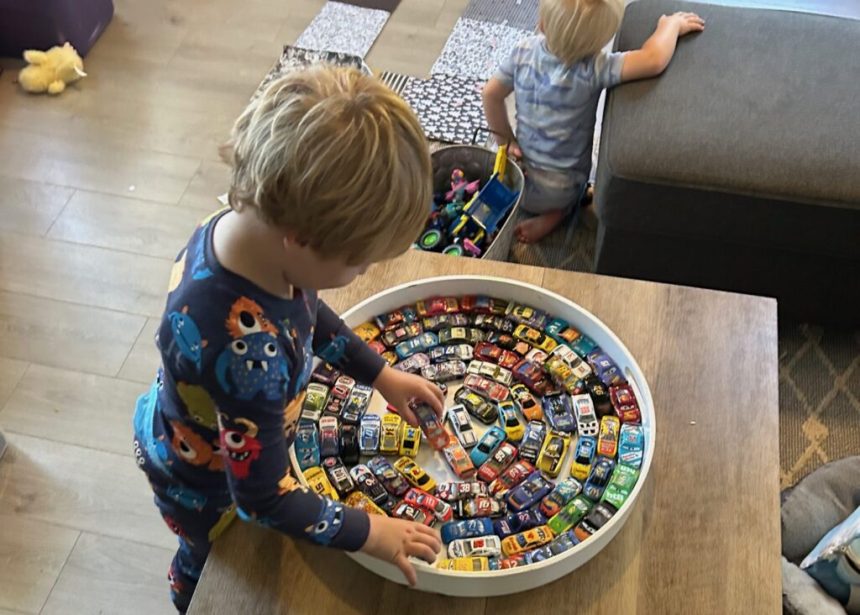Saige Bird, whose son is pictured here at their home in China, is among hundreds of Maine parents who have been waitlisted as Child Development Services transitions to a new model for serving 3- and 4-year-olds. (Photo by Lana Cohen/Maine Morning Star)
CHINA, Maine – When Saige Bird moved to Maine, her first order of business was to get support for her then 3-year-old son, who is autistic and has a speech impediment that renders him unintelligible to most people.
Over the past year and a half, she has struggled to get him the speech or other support he needs and is legally entitled to.
While Child Development Services — a quasi-state agency responsible for providing disability services to Maine children under the age of 5 — transitions to a new model for serving 3- and 4-year-olds, a significant number of preschoolers who remain in the existing system are being left behind.
Over the 2024-2025 fiscal year, 875 3- and 4-year-olds, or 15% of preschool-aged children served by Child Development Services, were on waitlists for 1,690 services including speech, occupational and physical therapy, according to data provided by the Maine Department of Education. Historically, Child Development Services has not kept track of waitlist data, but this is an increase from 2019, when a report requested by the Maine Legislature’s Education and Cultural Affairs Committee found that 10% of children requiring services were on waitlists.
When Bird’s son, whose name she asked be omitted for privacy reasons, was first referred to Child Development Services for evaluation, Bird was thrilled.
“I thought I was gonna get the help I need for my son,” she said.
But that excitement soon turned to disappointment.
Four months after her initial appointment, she received an email from a speech therapist, only to discover she was based in Texas and the sessions would be remote, which she didn’t think was a good fit for her son, then 4 years old, who is hyperactive and has a low attention span.
Another four months later, Child Development Services offered a preschool placement for her son at Augusta Children’s Center. She ultimately declined it due to, among other reasons, trouble scheduling around her son’s outside occupational and speech therapy.
“I know some people love the Children’s Center,” she said. “But it wasn’t right for my son and our family.”
Under federal law, children are supposed to receive all services they’re found eligible for within 30 days of being evaluated.
But that deadline is not always met.
“We are frequently hearing about waitlists and hearing that these waitlists are persisting,” said Jeanette Plourde, an attorney for Disability Rights Maine. “We continue to see parents being told in (Individualized Education Plan, known as IEP) meetings that (Child Development Services) doesn’t have the staffing, that there are no placements, that it’s just not possible to fulfill their child’s IEP.”
This, says Plourde, is simply not okay.
“Our state has an obligation to provide these services under federal and state law,” she said. “Full stop.”
Saige Bird, a mother who lives in China, has struggled to get her son the speech or other support he needs and is legally entitled to. (Photo by Lana Cohen/Maine Morning Star)
Bird is one of many parents who gave up completely and opted to find her child the services he needs in a different way. Three to five days a week, Bird drives an hour and a half round-trip to and from Belfast for in-person speech, which Child Development Services determined her son needed, and occupational therapy, which she sought separately. Since January, she has spent at least $550 on co-payments for both services.
The Maine Department of Education, which oversees Child Development Services, is well aware of the agency’s challenges, which are not new, and is working to turn the tide by transitioning the responsibility of providing preschool special education from Child Development Services to the state’s public schools, a mammoth task it says will better serve preschoolers by utilizing the state’s resources more efficiently.
But while Child Development Services works to implement this systemic change, there’s not much that can be done for the children who aren’t getting their needs met, said Child Development Services State Director Dan Hemdal.
“It’s an unfortunate reality of early childhood special education in the state,” said Hemdal of children ending up on waitlists.
Hemdal and others say that a lack of preschool placements and providers — including speech, occupational and physical therapists — can make it difficult, if not impossible, to match preschoolers with the resources they need.
But while the state works to create a system that better serves preschoolers with disabilities, children across the state lose valuable time.
The first five years of life are crucial for development and can shape the trajectory of a child’s life.
“You only have a certain amount of time while the brain is this plastic,” said Nancy Cronin, the executive director of the Maine Developmental Disabilities Council. “This is a magic time for development that no child can afford to lose.”









